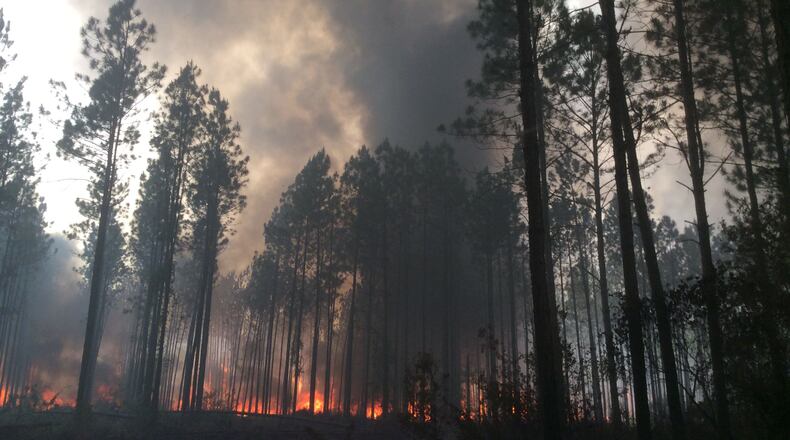When James Beck and his wife arrived on Amelia Island a week ago, they weren't thinking about the wildfires burning some 40 miles away in the Okefenokee Swamp. But the sprawling, creeping conflagration has a knack for getting in people's business, and by the end of the week the Fayetteville couple were dealing with a smell very different than fresh sea air.
"It smells like someone is burning garbage nearby," Beck, 55, said of the plumes of smoke from the fire. "But it does make for beautiful sun and moon rises."
The smell isn't overwhelming, he said, and it comes and goes with the wind. The beaches and hotels still seem full, Beck said, though people can't stop talking about the big fire that won't quit.
The wildfire has raged for more than a month in Southeast Georgia. The effect on tourism varies. The Okefenokee National Wildlife Refuge, where the fire started April 6, is taking the hardest hit. There, the fire is not only burning up large swaths of woodlands, it's also consuming tourism dollars.
Concern is rising that the wildfires, expected to burn at least through the summer, will cost even more as the region heads into the busy Memorial Day weekend that marks the launch of summer.
“This is our biggest time of the year,” said refuge spokeswoman Susan Heisey. The months of April and May — when the temperature warms, the bugs aren’t swarming, and school kids take field trips — accounts for more than a quarter of the refuge’s annual visitation. “We had to turn away 600 school kids the other day.”
Three of the five visitor entrances are closed, and campfires, charcoal grills and overnight camping are all forbidden throughout the place. The part of the refuge called the Okefenokee Swamp Park remains open, but it is seeing "a tremendous amount of cancellations. The phone is ringing off the hook," Heisey said.
The fire has scorched about 150,000 acres, which is about twice the size of the city of Atlanta. Areas that otherwise would be filled with tourists camping, boating and enjoying the natural surrounds, are now filled with some 700 firefighters running bulldozers over hot spots, firing water jets at burning trees and hosing down the smoldering earth.
Refuge officials say they’ve already lost tens of thousands of tourist dollars, and expect that could rise into the hundreds of thousands. That doesn’t even account for the lost dollars to area motels, bed and breakfasts, restaurants and stores.
The fire remains only 12 percent contained, and every day is a battle to keep it from spreading. Nobody knows for sure what it will do in the weeks ahead, as much depends on the strength and direction of the winds, the time of day and the moisture in the air and on the ground. The area's sustained drought has done nothing to help matters.
The large plumes of smoke have traveled tens of miles away to Amelia and St. Simons islands, popular beach vacation spots for Atlanta residents. In addition, white ash rained down on the beach destination of Jacksonville, Fla.
For now, hotel and tourism officials on the Georgia barrier islands say their bookings remain steady, with few if any cancellations looking ahead to the holiday. Some people are calling with questions and concerns.
“We’ve seen very little in the way of impact from the fire,” said Scott McQuade, president of the Golden Isles Convention and Visitors Bureau. That includes St. Simons, Little St. Simons, Sea and Jekyll islands. He added, “We’re certainly watching the fire closely.”
Meanwhile, the fire continues to receive very bad press. Fire officials are not even talking about significantly pushing it back. The fingers of the fire continue to expand their reach, at times by thousands of acres a day. While the firefighters have prevented the fire from taking even one life or home, the blaze remains an active threat to nearby communities such as St. George, Canady Loop and Moniac.
All this has some metro Atlantans questioning the wisdom of driving hours to this region, dealing with potential road blocks and smoky air, and risking one of their big vacations of the year.
The islands off Coastal Georgia may well be helped by a wind phenomenon that occurs during the warmer weather, said Nate McGinnis, a meteorologist with the National Weather Service in Jacksonville. Because the land heats faster than the water, the sea breezes tend to blow off the water in a westerly direction. These sea breezes could help keep the smoke away from the islands, he said.
James and Mary Beck, for their part, are still having a great time hitting the beach, flying kites and eating lots of shrimp.
On Saturday the wind shifted and the smell lightened up.
“It hasn’t slowed us down,” Beck said.
About the Author
Keep Reading
The Latest
Featured



